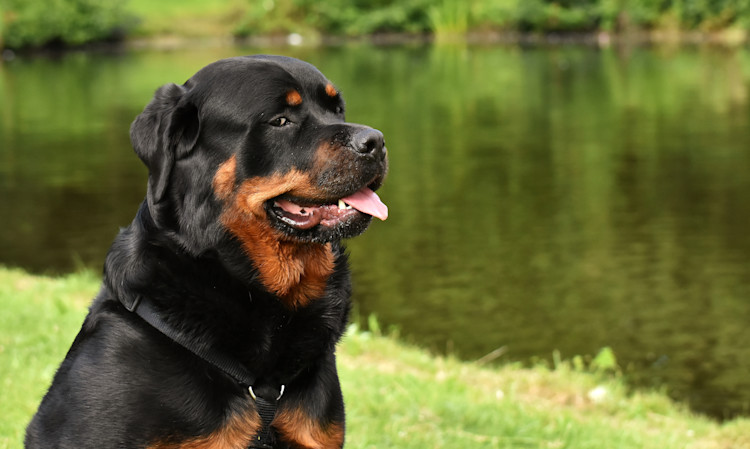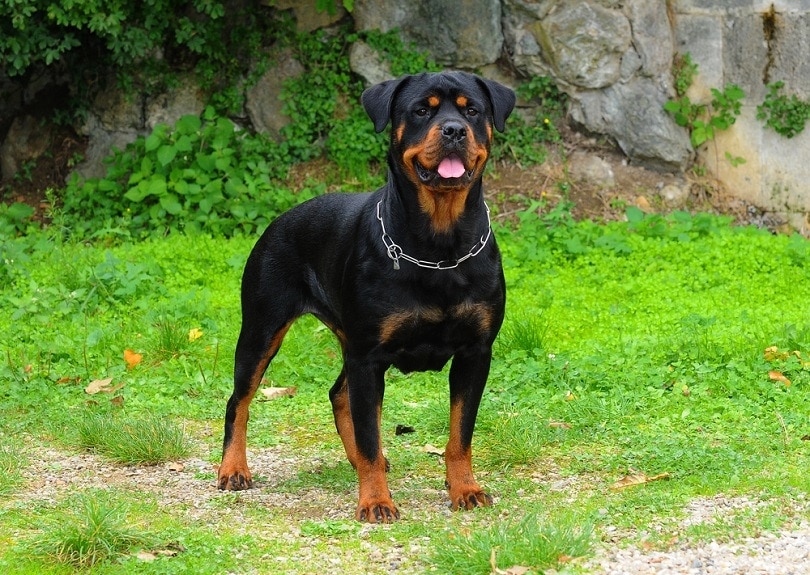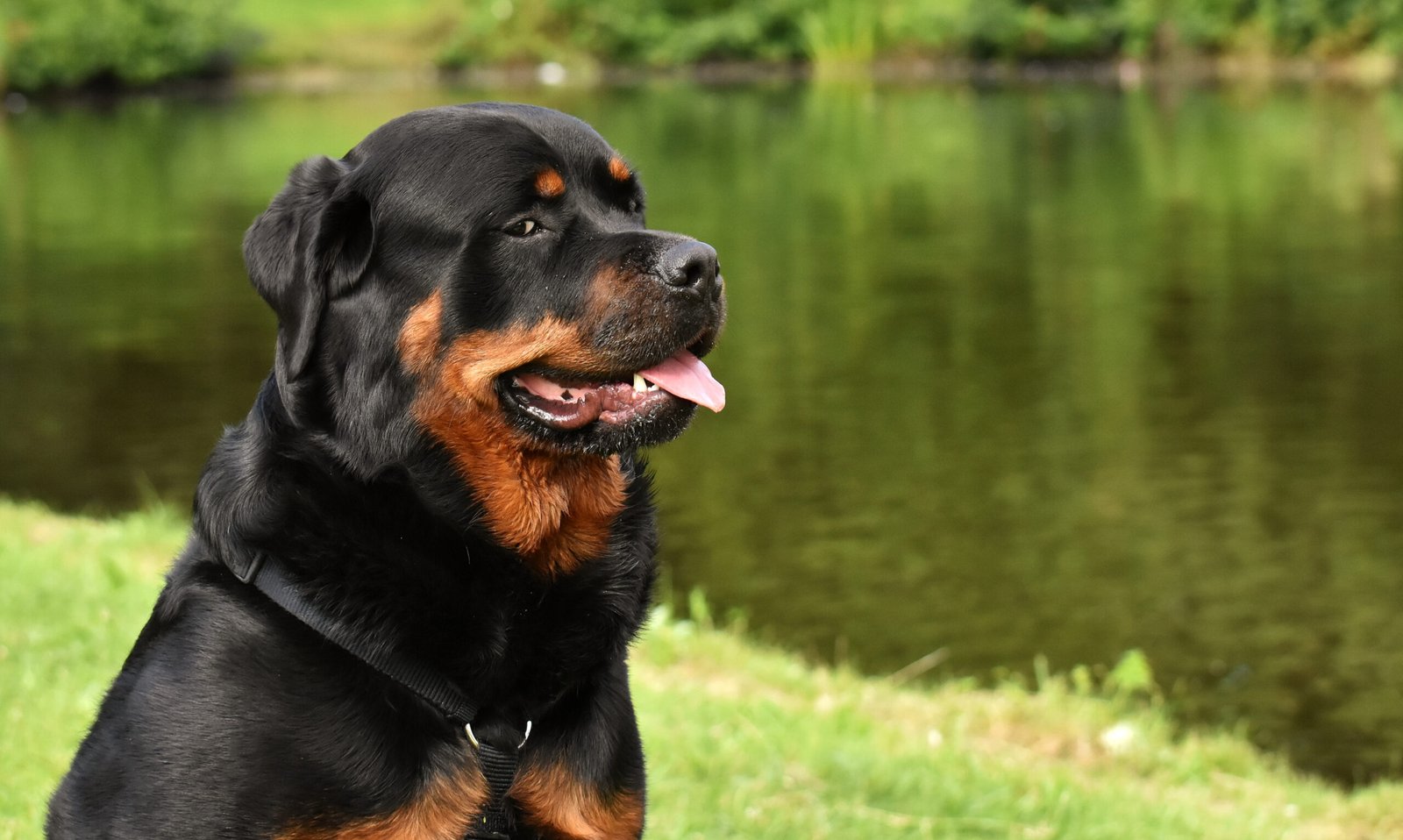Are you curious about the weight of Rottweilers? Well, let me break it down for you! Rottweilers are known for their impressive size and strength, but how much do they actually weigh? Let’s find out!
When it comes to Rottweiler weight, it can vary depending on factors such as genetics, diet, and exercise. On average, adult male Rottweilers usually weigh between 95 to 135 pounds, while females tend to weigh slightly less, ranging from 80 to 100 pounds.
It’s important to keep in mind that these weight ranges are just general guidelines, and individual dogs may fall above or below these numbers. Factors like bone structure and muscle mass can also influence a Rottweiler’s weight. So, if you’re a proud Rottweiler owner or just interested in these majestic dogs, stay tuned to learn more fascinating details about them!

What is the Ideal Weight for a Rottweiler?
Rottweilers are large and powerful dogs known for their strength and protective nature. As responsible pet owners, one of our duties is to ensure our Rottweilers maintain a healthy weight. But what is the ideal weight for a Rottweiler? In this article, we will dive into the factors that determine the weight range for Rottweilers, the average weight for males and females, and the importance of maintaining a proper weight for your beloved canine companion.
Factors Affecting Rottweiler Weight
Several factors play a role in determining the weight range for Rottweilers. These factors include genetics, age, activity level, and overall health. Genetics, in particular, can heavily influence a Rottweiler’s weight as different bloodlines can have variations in size and build. Additionally, the age of your Rottweiler will also impact their weight. Puppies generally weigh less than adult dogs, and their weight will gradually increase as they grow and develop.
Another important factor to consider is the activity level of your Rottweiler. Dogs who lead an active lifestyle and engage in regular exercise are more likely to maintain a healthy weight compared to those who have a sedentary lifestyle. Finally, a Rottweiler’s overall health can affect their weight. Certain health conditions or imbalances may cause weight gain or weight loss, so it’s crucial to monitor your dog’s health and seek veterinary advice if you notice any significant changes.
The Ideal Weight Range for Male Rottweilers
Male Rottweilers typically have a larger build and weigh more than their female counterparts. On average, the ideal weight range for adult male Rottweilers is between 95 to 135 pounds (43 to 61 kilograms). However, it’s important to note that every dog is unique, and variations in size within this weight range can be completely normal. It’s essential to assess your individual dog’s body condition and consult with your veterinarian to determine if they are within a healthy weight range.
When assessing a Rottweiler’s weight, it’s not just about the number on the scale. Other factors, such as muscle tone and body composition, also come into play. A well-muscled Rottweiler at the higher end of the weight range may still be within a healthy weight if their body condition is considered ideal.
To ensure your male Rottweiler maintains a healthy weight, it is recommended to provide them with regular exercise, balanced nutrition, and regular veterinary check-ups. Monitoring their weight and body condition can help you make necessary adjustments to their diet and exercise routine if needed.
The Ideal Weight Range for Female Rottweilers
Female Rottweilers typically have a slightly smaller build and weigh less than males. The ideal weight range for adult female Rottweilers is typically between 80 to 100 pounds (36 to 45 kilograms). Similarly to male Rottweilers, variations within this weight range can be considered normal depending on the individual dog’s body condition.
It’s important not to solely rely on weight as the sole indicator of a Rottweiler’s health. Regular body condition assessments by a veterinarian can help determine if a female Rottweiler is within a healthy weight range. Body condition scoring takes into account factors such as fat coverage, muscle tone, and overall physical appearance.
As with male Rottweilers, providing regular exercise, balanced nutrition, and routine veterinary care are essential for maintaining a female Rottweiler’s weight. Adjusting their diet and exercise routine as needed can help ensure they are in optimal health.
The Importance of Maintaining a Healthy Weight
Maintaining a healthy weight is crucial for the overall well-being of your Rottweiler. Obesity in dogs, including Rottweilers, can have serious consequences on their health and quality of life. Some of the potential risks associated with overweight or obese Rottweilers include:
- Joint Problems: Excess weight places additional stress on a dog’s joints, which can lead to conditions such as arthritis and hip dysplasia.
- Heart Disease: Overweight Rottweilers are at a higher risk of developing heart disease and other cardiovascular issues.
- Shortened Lifespan: Obesity has been linked to a shorter lifespan in dogs, reducing the amount of time you get to spend with your beloved Rottweiler.
- Decreased Quality of Life: An overweight Rottweiler may experience difficulty moving, decreased stamina, and reduced overall energy levels.
To maintain a healthy weight for your Rottweiler, it’s important to follow guidelines set by your veterinarian. This includes feeding them a balanced diet specific to their needs, providing regular exercise and mental stimulation, and monitoring their weight and body condition regularly.
Best Practices for Managing Rottweiler Weight
Managing your Rottweiler’s weight involves a combination of proper nutrition, exercise, and regular monitoring. Here are some best practices to help you keep your Rottweiler in optimal health:
1. Consult with Your Veterinarian
Always consult with your veterinarian when it comes to your Rottweiler’s weight. They can provide guidance specific to your individual dog’s needs and help you determine the ideal weight range to aim for.
2. Feed a Balanced Diet
Choose a high-quality dog food that is specifically formulated for large breed dogs like Rottweilers. Avoid overfeeding and follow the recommended portion sizes based on the dog food packaging and your veterinarian’s advice.
3. Regular Exercise
Provide your Rottweiler with regular exercise to keep them physically fit. This can include activities such as walks, runs, playtime, and mental stimulation exercises.
4. Monitor Their Body Condition
Regularly assess your Rottweiler’s body condition by using the body condition scoring system recommended by your veterinarian. Adjust their diet and exercise routine if needed to maintain a healthy weight.
5. Limit Treats and Table Scraps
Avoid excessive treats and table scraps, as these can contribute to weight gain. If you want to reward your Rottweiler, opt for healthy, low-calorie treats specifically made for dogs.
6. Regular Veterinary Check-ups
Take your Rottweiler for regular veterinary check-ups to monitor their overall health and weight. Your veterinarian can detect any potential weight-related issues early on and provide appropriate treatment or recommendations.
Importance of a Healthy Weight for Rottweilers
Maintaining a healthy weight is essential for the overall health and well-being of Rottweilers. It can help prevent various physical and medical issues, improve their quality of life, and potentially extend their lifespan. By following proper nutrition, exercise, and regular monitoring, you can ensure that your Rottweiler lives a happy and healthy life.
Key Takeaways: What is Rottweiler Weight?
- Rottweilers are large and muscular dogs that can weigh between 80 to 135 pounds.
- Male Rottweilers are generally heavier than females, averaging between 95 to 135 pounds.
- Female Rottweilers typically weigh between 80 to 100 pounds.
- The weight of a Rottweiler can vary based on genetics, diet, and exercise.
- It is important to provide proper nutrition and exercise to maintain a healthy weight for your Rottweiler.
Frequently Asked Questions
Welcome to our FAQ section about Rottweiler weight! Below, you’ll find answers to some common questions related to the weight of Rottweilers.
1. How much does a Rottweiler typically weigh?
Rottweilers are a large and robust breed, with average weights ranging between 80 to 135 pounds for males and 70 to 100 pounds for females. However, it’s important to note that individual Rottweilers can vary in size and weight based on genetics, diet, exercise, and overall health.
It’s always best to consult with a veterinarian to ensure your Rottweiler is maintaining a healthy weight and to receive personalized guidance based on their specific needs.
2. At what age is a Rottweiler fully grown?
Rottweilers typically reach their full size and weight between 18 months and 2 years of age. However, it’s worth mentioning that Rottweilers may continue to fill out and develop their muscles until the age of 3 or 4. During this growth period, it’s essential to provide proper nutrition and exercise to support their development.
Paying attention to your Rottweiler’s growth rate can help ensure they maintain a healthy weight and avoid any potential issues associated with rapid growth or obesity. Regular check-ups with a veterinarian can also help monitor their growth and well-being.
3. How can I help my Rottweiler maintain a healthy weight?
Maintaining a healthy weight is crucial for the overall well-being of your Rottweiler. To help them maintain a healthy weight, provide a balanced and nutritious diet that meets their specific needs. Feeding them a high-quality dog food and monitoring portion sizes can help prevent overeating and weight gain. Additionally, avoid giving excessive treats or table scraps that can contribute to obesity.
Regular exercise is also important for keeping your Rottweiler fit. Engage them in daily activities such as walks, play sessions, or even agility training to ensure they get the physical activity they need. However, always consider any underlying health conditions or limitations your Rottweiler may have and adjust their exercise routine accordingly.
4. Can Rottweilers become overweight?
Yes, Rottweilers can become overweight if their diet and exercise are not properly managed. Obesity in Rottweilers can lead to a range of health problems, including joint issues, heart disease, and a shortened lifespan. To prevent obesity, it’s important to monitor their weight, adjust their diet as needed, and provide regular exercise suited to their energy levels and abilities.
If you’re concerned about your Rottweiler’s weight or suspect they may be overweight, consult with a veterinarian. They can assess their body condition and provide guidance on appropriate weight management strategies.
5. Are there any health risks associated with being underweight or overweight?
Both being underweight and overweight can pose health risks for Rottweilers. If a Rottweiler is underweight, it may indicate an underlying health issue or inadequate nutrition. Being underweight can weaken their immune system, affect their bone health, and lead to a lack of energy. If you suspect your Rottweiler is underweight, consult with a veterinarian to determine the underlying cause and develop a proper plan for weight gain.
On the other hand, if a Rottweiler is overweight, it can put excessive strain on their joints, contribute to heart problems, and increase the risk of various conditions. Monitoring their weight and taking steps to maintain a healthy weight can help prevent these potential health risks.

Top 3 Reasons to Get a Rottweiler
Summary
So, now you know all about the weight of Rottweilers! They can weigh anywhere from 80 to 135 pounds when fully grown. It’s important to remember that every dog is different, so their weight might vary. If you have a Rottweiler, make sure to feed them a balanced diet and exercise them regularly to keep them healthy and happy. And don’t forget to give them lots of love and cuddles too!
